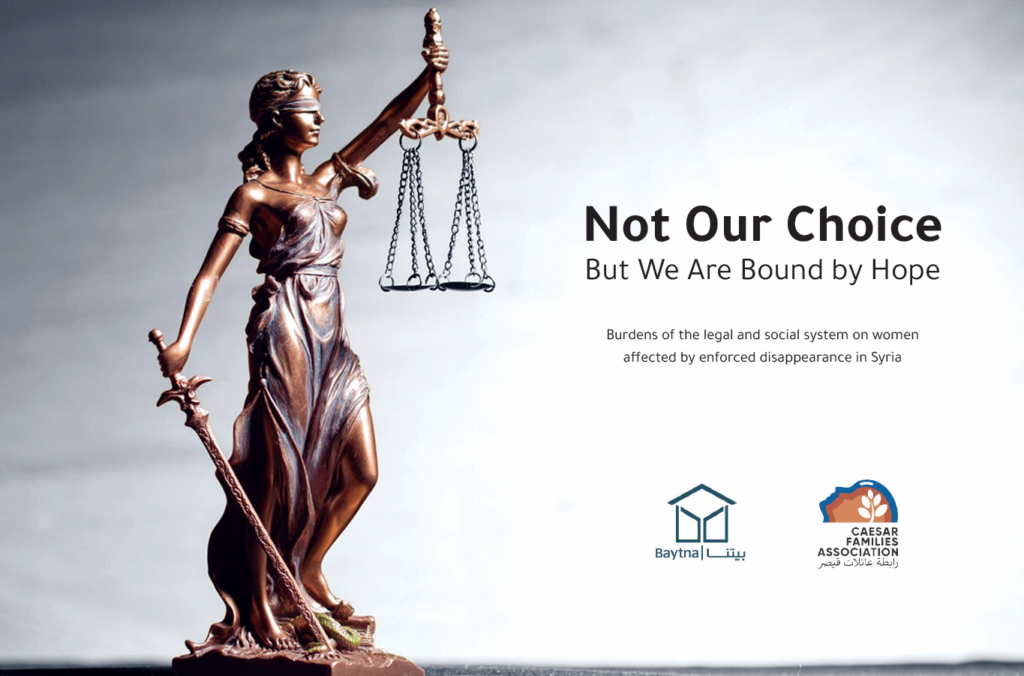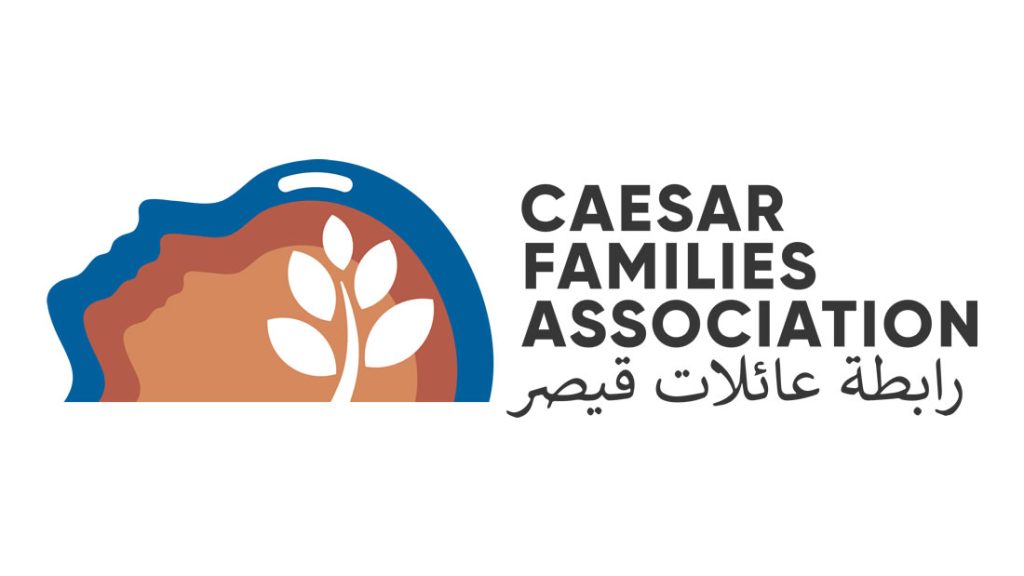Our lot is to Hope!
Our ears are straining to catch the footsteps of the absent yet ever-present. It is a slow-burning death and a story we live under the shadow of absence, confronting fate’s cruelest challenges with courage and pain.
We break the silence, rising to claim our rights, seeking solace in healing the wounds of loss and its lingering echoes.
We have transformed ourselves from mere executors of stereotypical roles into leaders, guiding our families through the storm, championing our cause, wielding the power of law, media, and documentation, and unwavering support for fellow families.
Our voices echo with a clarion call, demanding the release of our loved ones, the revelation of their fates, and the recovery of the remains of the deceased.
We stand like unyielding rocks, pillars of strength everyone leaned on, our warm embrace concealing a universe of pain behind its unwavering smiles.
Not Our Choice, But We Are Bound by Hope
Burdens of the legal and social system on women affected by enforced disappearance in Syria
An analytical report was conducted by the Caesar Families Association in collaboration with “Baytna”, after conducting 50 interviews with women affected by the enforced disappearance of a male family member in Syria.
Executive Summary
This report presents an analysis of interviews with fifty women affected by the enforced disappearance of a male family member in Syria. The report aims to conduct a comparative analysis between the real experience of these women[1] as the key stakeholders, and the impact of the existing legal and social frameworks and systems in Syria. Women’s experiences demonstrate the failure of the legal systems in Syria to respect, protect and fulfill women’s rights. Moreover, these systems are complicit in further depriving the women of their rights, especially through the perpetuation of structural discrimination and violence at the societal level. Women’s experiences demonstrated the absence of a rights-based approach in dealing with enforced disappearance and its impact on them. Instead, the response to this impact has been limited to either placing the burden on women or providing temporary and often conditional responses.
Based on this comparative analysis, the report concludes with a set of findings. Caesar Families Association aims by presenting these findings to raise awareness of the issue of enforced disappearance through a victim- and rights-centered approach. The aim is also to direct all relevant actors towards a serious engagement with this issue based on this approach, whether in terms of immediate response, addressing root causes, or potential paths to justice and transitional justice. The main findings can be summarized as follows:
- The failure of Syrian law to protect against enforced disappearance and its effects on the family in general and women in particular is not limited to Syria’s non-accession to the International Convention for the Protection of All Persons from Enforced Disappearance (ICPPED), but rather is evident in the laws and measures in force that – in addition to encouraging the commission of enforced disappearance – exacerbate discrimination against women and direct and indirect violence against them by depriving them of many of their rights as a result of the enforced disappearance of the male breadwinner in their family.
- The right of families to know has no real value in Syrian law and procedures. The burden of enjoying this right is particularly placed on women. This is not only because of the legal texts themselves, but also because they either are based on or support patriarchal social systems.
- Women’s experiences are practical evidence that the Syrian authorities’ implementation of their obligations in accordance with the Convention on the Elimination of All Forms of Discrimination against Women (CEDAW) is limited to some legislation and bodies. By comparing these experiences with the interpretations of the provisions of this Convention, it becomes clear how the State has failed to fulfill the purposes and objectives of the Convention, foremost among which is to address structural social discrimination.
- “Death Certificate” poses a challenge that entails several burdens imposed on women affected by enforced disappearance. First, women are enforced to make the decision to issue it due to the existing legal and social systems and frameworks. Second, despite being deprived of the free will to issue the certificate, they fall victim to many episodes of difficulties in issuing it for legal, procedural, and social reasons, as well as additional challenges resulting from forced displacement.
- For many women, the “Caesar” photos represent a form of incomplete truth that entails unfair human burdens on the one hand, and ambiguous legal considerations on the other. The fact that women are forced to use these photos to obtain the right to legal personality and access to their other rights is in itself a continuation of the anguish and grief resulting from enforced disappearance and the lack of knowledge of the fate and whereabouts of the victim. The “Caesar” photos shall not be considered a disclosure of the truth, nor shall the coercion of women to acknowledge the fate of the victims be considered informed consent on their part to obtain them.
- Lack of rights-based support interventions from all stakeholders, whether official, humanitarian, or legal, is a general phenomenon. Support is limited to temporary and localized relief, which is considered a challenge for women due to the policies and administrative and procedural requirements, which in turn are added to the burdens of the rest of the procedures required by other life and livelihood matters for women affected by enforced disappearance.
- Certain documentation practices that do not meet professional and ethical standards have had a negative impact on women in terms of efforts to search for the victim, manage expectations, prevent trauma, and respond to needs, which contributed to the absence of their central role and treating them as a source of information only. These practices and their results made many women lose their trust in the human rights effort and diminished their hope and willingness to participate effectively in it, which will require greater effort later to involve them effectively as a basis for working on their issues.
- The range of rights affected by enforced disappearance in women’s experiences expands to be long-lasting and devastating, not only for them, but also for their family members, especially children. Existing legal and social systems combine to have a significant impact not only on the spectrum of civil and political rights, but also on economic, social and cultural rights. The effects on the rights to education, an adequate standard of living, health, special protection for mothers, work, social security, and the protection and well-being of children are some of those rights whose violations have consequences for generations to come.
- The lack of knowledge is evident as a common element in the experiences of all women, whether with regard to immediate measures following a disappearance, or in dealing with it in the short and long term, as well as at the level of their rights that must be fulfilled. This reality has not changed for women in comparison to the length of time following disappearance or relocation and the changing environment in which they interacted. Women have not had actual experiences indicating the existence of real efforts to provide them with informed knowledge about these issues from various official and unofficial entities.
- Women affected by enforced disappearance are forced to deal with the struggle for survival and identity due to the existing legal and social system that imposes irrational contradictions on them, such as forcing them to bear the economic burdens resulting from disappearance, while at the same time forcing them to submit to social patterns based on gender discrimination and patriarchal power hierarchies.
- The experiences of some women have highlighted a category of victims and families that are typically – at least in the available literature – ignored and not studied: victims of enforced disappearance who are official employees within the Syrian security and military apparatus. Women affected by the disappearance of this category were subjected to additional types of legal, procedural, and social burdens, and found themselves in a cycle of stigmatization and accusation both officially and socially, with the resulting costs in terms of their rights.
- The establishment of the Independent Institution for Missing Persons in Syria (IIMP) is a practical model of what victims and their families, especially women, can achieve when they are able to exercise their natural role at the center of human rights issues. This is an opportunity to place women affected by enforced disappearance, especially inside Syria, in their assumed position within the context of the structural component of victims and families in the IIMP. The IIMP, through its mandate to support victims’ families, also constitutes an appropriate entry point to activate a rights-based approach to responding to the effects of enforced disappearance.
- The experience of the Victims and Families Associations in leading work on the file of detainees and forcibly disappeared persons has demonstrated clear success. This success can be built upon in pioneering interaction and outreach to victim and family communities on a broader scale, and on playing a pivotal role in verification and research processes and sparing them from practices of extortion, exploitation, and mismanagement of expectations. The move towards forming new associations or achieving greater access to existing associations is one of the pillars of a victim-centered approach that ensures broader and more inclusive representation and enables them to lead participation in the paths of truth and justice.
[1]This report uses the term “women” to refer specifically to the women interviewed who were affected by enforced disappearance.
Not Our Choice
Our hope endures in reclaiming our rights and achieving justice.
Acknowledgments:
The Author is extremely grateful to the Fifty Women who shared their experiences and insights with courage, patience, and resilience despite the challenging circumstances they face. Special thanks to Caesar Families Association and particularly its Documentation Team for their dedication to working with the Author in advance of, during, and after the interviews with women, including in the analysis of the interviews.
First Edition – 2024
All rights reserved by Caesar Families Association – 2024
www.caesarfamilies.org


